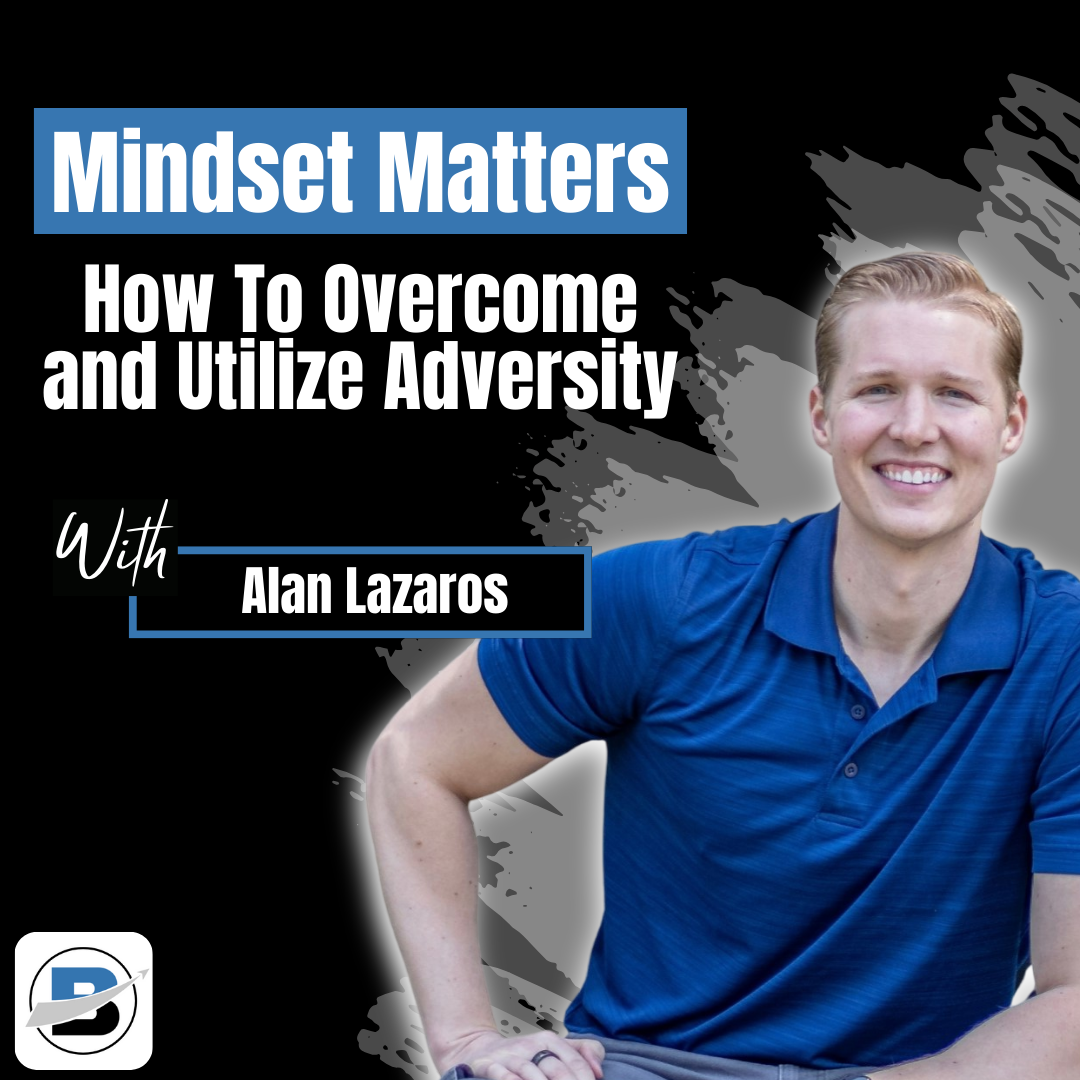Overcoming Self-Doubt and Finding Balance for Entrepreneurial Success
Introduction
As a young entrepreneur or small business owner, you know that the road to success isn’t always smooth. You’re constantly juggling decisions, facing challenges, and pushing through setbacks. One of the biggest hurdles you’ll face is managing your own self-doubt and finding a balance between being overly optimistic and too pessimistic. But how do you do that while building and growing your business?
This is exactly what Alan Lazaros, a successful business coach and entrepreneur, shares in a recent episode of the Brothers Frontier Podcast. In this blog post, we’ll explore the key lessons Alan shares about overcoming self-doubt, achieving balance in your mindset, and how he found entrepreneurial success through Next Level University.
The Struggle with Self-Doubt: Alan Lazaros’s Journey
Before we dive into the mindset strategies, it’s crucial to recognize that self-doubt doesn’t discriminate—it affects everyone, from budding entrepreneurs to seasoned industry leaders. Alan Lazaros, a respected business coach and motivational speaker, is no stranger to this inner battle. Despite his impressive achievements, including helping countless entrepreneurs unlock their potential, Alan openly shares his ongoing struggles with self-doubt. His story serves as a reminder that success doesn’t eliminate insecurity; instead, it often invites a new set of challenges. By acknowledging his own vulnerabilities, Alan sets the stage for deeper conversations about personal growth and resilience.
One of Alan’s most relatable struggles stems from comparing himself to his past self, particularly in the realm of fitness. A former fitness model and competitor, Alan often reflects on the physical discipline and aesthetic standards he once upheld. While his priorities have shifted to focus on business and personal growth, the mental habit of comparison lingers. This experience is not unique—many of us find ourselves comparing our current achievements or progress to an idealized version of the past. Whether it’s lamenting a business that hasn’t grown as expected or critiquing our productivity, the feeling of not measuring up can be paralyzing. Alan’s transparency about this ongoing challenge sheds light on how self-doubt manifests in even the most successful individuals.
However, Alan’s journey isn’t defined by these doubts—it’s shaped by how he addresses them. One of his key strategies is reframing his perspective. Rather than viewing his past self as a benchmark for success, he uses it as a source of inspiration for how far he’s come and where he wants to go. This subtle shift from comparison to reflection empowers him to focus on what he can control in the present. Alan emphasizes that self-doubt is not a sign of failure but an invitation to grow. By redefining his relationship with doubt, he reinforces the importance of embracing imperfection as part of the process.
Another essential lesson Alan shares is the value of vulnerability in overcoming self-doubt. As a coach, he finds strength in sharing his experiences with his clients, creating a space for mutual understanding and growth. Vulnerability, he argues, is not a weakness but a bridge that connects us to others. By normalizing discussions about self-doubt, Alan encourages entrepreneurs to be honest about their struggles and seek support when needed. This openness not only builds trust but also fosters a community where individuals feel less isolated in their journeys.
Ultimately, Alan Lazaros’s story is a testament to the power of mindset in navigating self-doubt. He reminds us that acknowledging our insecurities is the first step toward overcoming them. Success isn’t about eliminating self-doubt entirely; it’s about learning to coexist with it and using it as fuel for growth. Alan’s journey serves as a powerful example of how self-awareness, reframing, and vulnerability can transform self-doubt from a barrier into a stepping stone toward greater achievements.
Understanding the Balance Between Optimism and Pessimism
A key element of building the right mindset for business success is learning how to balance optimism and pessimism. In the episode, Alan emphasizes that many entrepreneurs tend to swing between two extremes. On one hand, being overly optimistic can lead to unrealistic expectations, while being overly pessimistic can stunt growth by limiting your potential. But how do you find the right balance?
Alan explains that entrepreneurs who are overly optimistic often fail to recognize risks and challenges. They become so consumed by their vision of success that they overlook the realities of running a business. On the flip side, entrepreneurs who are too pessimistic may feel like success is out of reach, which leads them to take fewer risks and avoid making bold moves.
The key, Alan suggests, is to find a middle ground. If you’re someone who tends to be overly pessimistic, it’s essential to work on believing in yourself and your potential. Trust that the work you put in will pay off, and embrace the idea that setbacks are simply part of the process.
On the other hand, if you tend to be overly optimistic, you need to practice humility and stay grounded. As Alan advises, you need to “eat humble pie every day” and challenge yourself to grow. Recognizing your weaknesses, being realistic about your goals, and being willing to put in the work will help you stay on track toward long-term success.
The Hidden Struggles Behind High Self-Belief
While self-belief is often seen as a key ingredient for success, Alan points out an important truth: people with high self-belief often struggle with low self-worth. This might sound counterintuitive, but it’s something that many entrepreneurs experience. They set huge goals and have grand dreams, but they may also feel isolated or misunderstood because of the intense pressure they put on themselves.
In Alan’s experience, many individuals with high self-belief are often labeled as arrogant or unlovable. But the truth is, they may simply have huge ambitions and are constantly pushing themselves beyond their limits. On the other hand, individuals who appear humble may actually struggle with self-doubt and internal arrogance. They may not put in the necessary work because they don’t believe in themselves enough to take action.
Alan emphasizes that it’s essential to recognize where you fall on this spectrum. If you tend to be overly optimistic and have high self-belief, it’s critical to stay humble. Recognize that confidence is not just about grand dreams; it’s about knowing that you can handle the challenges that come with them.
By staying grounded and acknowledging your weaknesses, you’ll be better equipped to achieve success without succumbing to arrogance or self-doubt. Humility is an essential part of maintaining a healthy mindset while striving for greatness.
The Role of Vulnerability and Honesty in Growth
One of the most powerful lessons Alan shares is the importance of vulnerability and honesty in both business and personal growth. As an analytical mind, Alan admits that he’s not naturally comfortable being open about his struggles. However, over time, he’s learned that vulnerability is key to personal and professional development.
Alan explains that being vulnerable and honest with yourself about your challenges is a critical part of growing as an entrepreneur. “Distortion is everywhere…” he says. “We’re pretending we’re in great shape when we’re not; we’re pretending everything is great when it’s not...”. The same applies to entrepreneurs: pretending everything is fine when it’s not can lead to burnout, failure, or even a loss of passion for your business.
On the other hand, acknowledging your weaknesses and being honest with yourself creates space for real growth. You begin to recognize areas for improvement, identify where you need support, and take actionable steps toward solving your challenges.
Honesty doesn’t mean being overly self-critical, but it does mean taking a hard look at your business and your mindset to identify where change is needed. This clarity allows you to move forward with confidence and align your actions with your long-term goals.
Shifting Your Mindset: From Self-Doubt to Self-Confidence
Overcoming self-doubt and building self-confidence isn’t an overnight process, but Alan offers several practical tips to help you shift your mindset. First and foremost, it’s essential to recognize when you’re being too hard on yourself or too overconfident. Both extremes can lead to problems.
If you’re struggling with self-doubt, Alan suggests focusing on small wins and celebrating the progress you’re making. By setting realistic goals and acknowledging your achievements, you can build a sense of self-worth and move forward with more confidence. Surround yourself with a supportive community of like-minded individuals who encourage your growth.
On the other hand, if you tend to be overly confident, it’s important to practice humility. Stay grounded, acknowledge your limitations, and consistently challenge yourself to grow. It’s okay to dream big, but it’s also crucial to stay focused on the work that needs to be done to achieve those dreams.
Alan’s advice is simple but powerful: focus on the process, trust yourself, and take small steps every day to move closer to your goals. The more you build your self-belief, the more confident you’ll become in your abilities as an entrepreneur.
Business Success Starts with Knowing Yourself
At the heart of entrepreneurial success lies self-awareness. Alan emphasizes that entrepreneurs need to understand their own strengths and weaknesses in order to make better business decisions. If you’re not aware of your limitations, it’s easy to fall into bad habits or make decisions that set you back.
Self-awareness allows you to understand where you need to improve and where you can leverage your strengths. It also plays a significant role in leadership. By understanding yourself better, you can become a more effective leader, create stronger relationships with your team, and make smarter business decisions.
Ultimately, knowing yourself leads to better decision-making and a more successful business. When you are self-aware, you can recognize when to pivot, when to push forward, and when to ask for help. This clarity helps you stay on track and avoid unnecessary roadblocks.
Key Lessons from Alan Lazaros’s Experience for Entrepreneurs
Alan Lazaros’s journey offers several key lessons for entrepreneurs looking to build a successful business while maintaining a healthy mindset. Here are the most important takeaways:
- Candor is Essential: Being honest with yourself about your strengths, weaknesses, and challenges is crucial for growth.
- Balance is Key: Finding the right balance between optimism and pessimism helps you avoid both burnout and missed opportunities.
- Vulnerability Leads to Growth: Opening up about your struggles and being vulnerable with yourself and others fosters real growth.
- Know Yourself: Self-awareness is the foundation for making sound decisions, leading effectively, and growing your business.
- Small Wins Matter: Don’t be too hard on yourself. Celebrate the small victories as they contribute to your long-term success.
Conclusion: The Power of Optimism and Self-Awareness in Entrepreneurial Success
Alan Lazaros’s insights offer young entrepreneurs and small business owners a powerful framework for navigating the challenges of entrepreneurship. By balancing self-belief with humility, embracing vulnerability, and maintaining a clear sense of self-awareness, you can overcome self-doubt and build a strong foundation for success.
As you continue your entrepreneurial journey, remember that growth takes time and effort. Stay grounded, celebrate your progress, and most importantly, be honest with yourself. With these tools, you can achieve the success you’ve always dreamed of.

